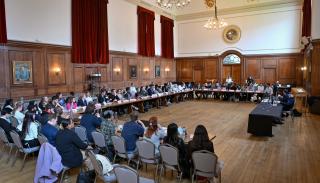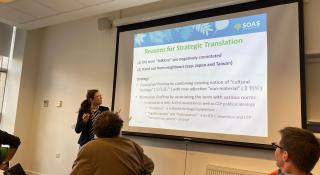
Breadcrumbs navigation
Taking part in a climate negotiation simulation
On 26 April 2023, we hosted our annual undergraduate climate change simulation at Goodenough College in London. The event was intended to raise awareness of the politics of climate change through a simulated negotiation around reducing greenhouse gas emissions, agreeing on suitable targets, and setting up a climate finance facility. Here we talk to Felix Smart (Aberystwyth University) about his experience and the skills he used and learned.
Which course do you study and what year are you in?
I study L252 Strategy, Intelligence and Security and am a second year.
Why did you want to take part in the climate negotiation simulation?
I took a climate change politics module in the first semester, and although I've done crisis games and some model UN-type activities, I had never done one based around climate governance.
Did you know much about climate change politics beforehand, and how has your experience and preparation for the simulation changed this?
Yes, I took a module on climate change politics and subsequently knew about some of the climate regimes already in place. In terms of the simulation, this helped me to understand the capabilities of both my own countries and other countries.
What did you do to prepare to act as your designated country?
I read through the recommended documents, did some wider reading on the EU and had a brief read of the overview of the paper the simulation was based on.
What were the best and also the most challenging things at the event?
The best part of the event was actually being able to (if realistically or not) break the stalemate of real-world politics: we were able to agree on some pretty radical solutions that would not be taken with the same urgency as real-world-climate-governance.
The most challenging aspect of this simulation was the cost of such hopefulness - and the fact that although our 90% carbon reduction pledge was internal, we were told it was unrealistic for the EU.
What skills do you think you developed or had the chance to use as a result of taking part and how will you use these going forward?
I think I primarily developed caucusing skills, which will be useful in more formal debates and simulations like this. I also learned management skills from the direction and relaying of information from my teammate, who acted as my secretary.
Is there anything you would do differently if you took part in a similar event in the future?
I think a solid grounding in the physical ramifications of our actions: although feasible - there was an extent we should have stuck to.


